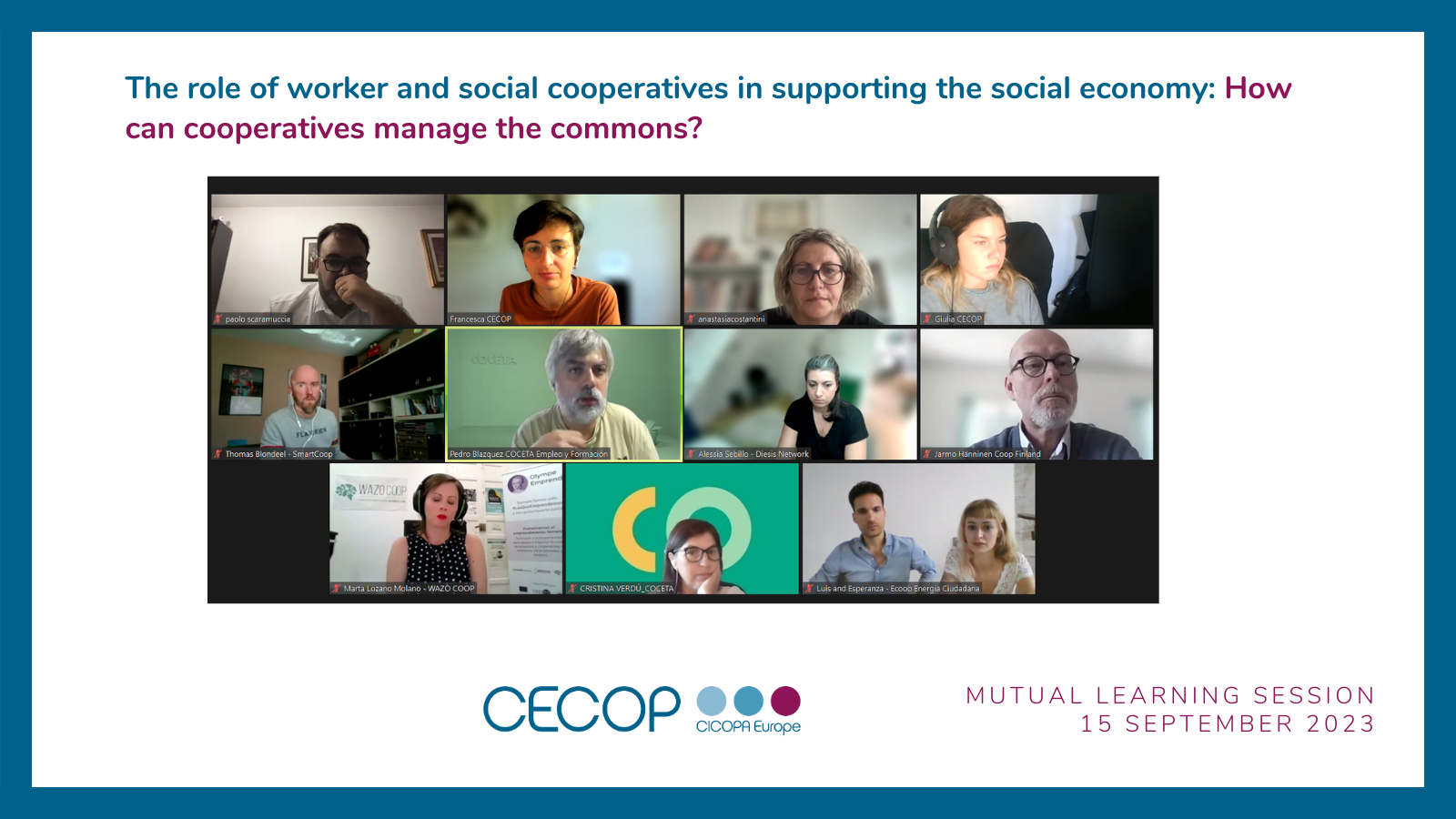According to the International Association for the Study of the Commons (IASC), “commons” refer to a broad set of resources, natural and cultural, that are shared by many people. Traditional examples of commons include forests, fisheries, or groundwater resources, but increasingly we see the term commons used for a broader set of domains, such as knowledge commons, digital commons, urban commons, health commons, cultural commons, etc.
Many workers and social cooperatives are involved in the protection and promotion of such commons. This Mutual Learning session aimed at exploring and understanding the different ways in which social and worker cooperatives promote commons.

During three online sessions held from September to December, members from Italy, France, Spain, and the UK, shared examples of community, energy, digital, and cultural cooperatives.
Community cooperatives, mostly multistakeholder types of cooperatives, are often a response to the depopulation of areas and the consequent disappearance of essential community services that are not economically viable, such as the local bar. The Ivy House, a pub in south London was about to be transformed into a supermarket after its closure but the community saved it by raising money and obtaining grants to buy it.
In Urban areas, community cooperatives create unity and foster the neighbourhood identity by preserving localised services. Like the cooperative Passo della barca, in Bologna created by the neighbourhood inhabitants to preserve a stand in the main square of the neighbourhood, which had a central role in the life of the inhabitants.
Energy cooperatives, providing sustainable energy solutions to urban and rural communities, guarantee ownership of the energy supply to people using it, fostering a belonging to the territory in which the energy is produced while reinvesting in its development. Ecooo is a worker cooperative of 30 professionals working for the promotion of sustainable energy communities in Spain.
There are many examples of cooperatives active in the promotion of the cultural common. In Italy CulTurMedia affiliates around 1.500 cooperatives throughout the Italian territory in the sectors of cultural heritage and entertainment, tourism, information, and communication. These cooperatives employ 10.000 workers and constitute a primary tool of social inclusion. In Spain, the wazo.coop enhances rural development through the promotion of creative cultural industries in rural areas.
Looking at the future, digitalisations demand cooperatives to propose democratic and participatory solutions to access online tools and platforms. In France, there are examples of social cooperatives that offer open-source solutions to sell and buy products, such as the cooperative CoopCircuit or to access data, such as the cooperative Startin Blox. In the UK, the Digital Common Cooperative develops tools for mapping and visualisation of data to offer tech solutions for people and creates digital products to connect cooperatives around the world.
These diverse cooperatives present different challenges related to their uniqueness. However, some common challenges can be identified, such as the need for developing innovative forms of governance to represent a large and diverse membership, the lack of financial resources that can be overcome by enhancing public and private partnerships, the upskilling and reskilling of workers, and the need to combine protection and preservation of the common while seeking to innovate and transform.
Besides these challenges, the cooperative form is often chosen because identified as the best enterprise model to reflect the values of these communities. They provide services that are essential to the community, sustainably and democratically, providing durable and cost-efficient solutions.
CECOP thanks all the participants for their collaboration and contribution and looks forward to continuing working on the topic.
|
This event has been funded by the European Union. Views and opinions expressed are however those of the authors only and do not necessarily reflect those of the European Union or the European Commission. Neither the European Union nor the granting authority can be held responsible for them. |
 |









